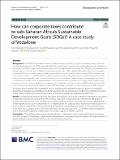Files in this item
How can corporate taxes contribute to sub-Saharan Africa's Sustainable Development Goals (SDGs)? : A case study of Vodafone
Item metadata
| dc.contributor.author | Hannah, Eilish | |
| dc.contributor.author | O'Hare, Bernadette | |
| dc.contributor.author | Lopez, Marisol | |
| dc.contributor.author | Murray, Stuart | |
| dc.contributor.author | Etter-Phoya, Rachel | |
| dc.contributor.author | Hall, Stephen | |
| dc.contributor.author | Masiya, Michael | |
| dc.date.accessioned | 2023-03-23T17:34:46Z | |
| dc.date.available | 2023-03-23T17:34:46Z | |
| dc.date.issued | 2023-03-20 | |
| dc.identifier | 283822202 | |
| dc.identifier | 23b7a5af-6d69-433a-8ebd-281c24c16ea9 | |
| dc.identifier | 36935478 | |
| dc.identifier | 85150531717 | |
| dc.identifier.citation | Hannah , E , O'Hare , B , Lopez , M , Murray , S , Etter-Phoya , R , Hall , S & Masiya , M 2023 , ' How can corporate taxes contribute to sub-Saharan Africa's Sustainable Development Goals (SDGs)? A case study of Vodafone ' , Globalization and Health , vol. 19 , no. 1 , 17 . https://doi.org/10.1186/s12992-022-00894-6 | en |
| dc.identifier.issn | 1744-8603 | |
| dc.identifier.other | ORCID: /0000-0002-9544-1129/work/131588382 | |
| dc.identifier.other | ORCID: /0000-0003-1730-7941/work/131588407 | |
| dc.identifier.other | ORCID: /0000-0003-0293-7334/work/131588896 | |
| dc.identifier.other | pmcid: PMC10024962 | |
| dc.identifier.other | Jisc: 969049 | |
| dc.identifier.other | publisher-id: s12992-022-00894-6 | |
| dc.identifier.other | manuscript: 894 | |
| dc.identifier.uri | https://hdl.handle.net/10023/27256 | |
| dc.description | Funding: This research was funded by the Scottish Funding Council, Global Challenges Research Fund, The Professor Sonia Buist Global Child Health Research Fund, the MRC IAA and Wellcome ISSF funding. | en |
| dc.description.abstract | BACKGROUND The COVID-19 pandemic and the climate emergency threaten progress in reaching many of the Sustainable Development Goal (SDG) targets by 2030. The under-5 mortality and maternal mortality rates are well below the targets, and if we progress at the current pace, there is a high risk of not meeting the 2030 goals. Furthermore, the initial progress in the decline in child and maternal mortality since 1990 is likely to be eroded. Much of this progress has resulted from increased sanitation, drinking water, education, and health service coverage. The adequate provision of public services is possible if there is sufficient government funding. When governments have more income, they spend more on public services, which increases access to fundamental economic and social rights and, thus, contributes to the SDGs. One of the key drivers of government financing, taxation, constitutes 70% of government revenue in low- and lower-middle-income countries. Corporate income tax constitutes 18.8% of tax revenue in African countries compared to 10% of tax revenue in OECD countries. Therefore, it plays a critical role in SDG progress. This paper aims to quantify the contribution of one large taxpayer, that publishes their tax payments, (Vodafone Group Plc) on progress towards SDGs in six African countries. We use econometric modelling to estimate the impact of an increase in government revenue equivalent to Vodafone's average tax paid between 2007-2017. RESULTS We find that government revenue equivalent to Vodafone's taxes made a significant contribution to progress in attaining selected SDGs. We found that the revenue equivalent to Vodafone's taxes allowed 966,188 people to access clean water and 1,371,972 people to access basic sanitation each year. Over the time period studied, 858,054 children spent an extra year in school and 54,275 children under five years and 3,655 mothers survived. In just one of these countries, Tanzania, the revenue equivalent to Vodafone's tax contribution allowed 174,121 people to access clean water and 223,586 to access sanitation each year. Over the time studied 187,023 children spent an additional year at school, 6,569 additional children under five and 625 additional mothers survived. CONCLUSIONS These findings demonstrate that the reported contributions from a single multinational corporation drive SDG progress. Furthermore, it highlights the importance of transparent taxes and explores the responsibilities of global institutions, governments, investors, and multinational corporations. | |
| dc.format.extent | 15 | |
| dc.format.extent | 1018223 | |
| dc.language.iso | eng | |
| dc.relation.ispartof | Globalization and Health | en |
| dc.subject | Corporate taxes | en |
| dc.subject | Tax avoidance | en |
| dc.subject | Corporate social responsibility | en |
| dc.subject | Human rights | en |
| dc.subject | Right to health | en |
| dc.subject | GF Human ecology. Anthropogeography | en |
| dc.subject | HJ Public Finance | en |
| dc.subject | 3rd-DAS | en |
| dc.subject | SDG 3 - Good Health and Well-being | en |
| dc.subject | SDG 6 - Clean Water and Sanitation | en |
| dc.subject | SDG 12 - Responsible Consumption and Production | en |
| dc.subject | MCC | en |
| dc.subject.lcc | GF | en |
| dc.subject.lcc | HJ | en |
| dc.title | How can corporate taxes contribute to sub-Saharan Africa's Sustainable Development Goals (SDGs)? : A case study of Vodafone | en |
| dc.type | Journal article | en |
| dc.contributor.sponsor | Medical Research Council | en |
| dc.contributor.sponsor | The Wellcome Trust | en |
| dc.contributor.sponsor | Scottish Funding Council | en |
| dc.contributor.institution | University of St Andrews. School of Medicine | en |
| dc.contributor.institution | University of St Andrews. Population and Behavioural Science Division | en |
| dc.contributor.institution | University of St Andrews. Infection and Global Health Division | en |
| dc.identifier.doi | https://doi.org/10.1186/s12992-022-00894-6 | |
| dc.description.status | Peer reviewed | en |
| dc.identifier.grantnumber | 10_Bernie O'Hare | en |
| dc.identifier.grantnumber | N/A | en |
| dc.identifier.grantnumber | N/A | en |
This item appears in the following Collection(s)
Items in the St Andrews Research Repository are protected by copyright, with all rights reserved, unless otherwise indicated.

